China History
A Chinese Christmas Message: It’s Not Santa Bringing Peace, but the People’s Liberation Army
On social media, Chinese official channels are not celebrating a Merry Christmas but instead focus on a Military Christmas.
Published
1 year agoon
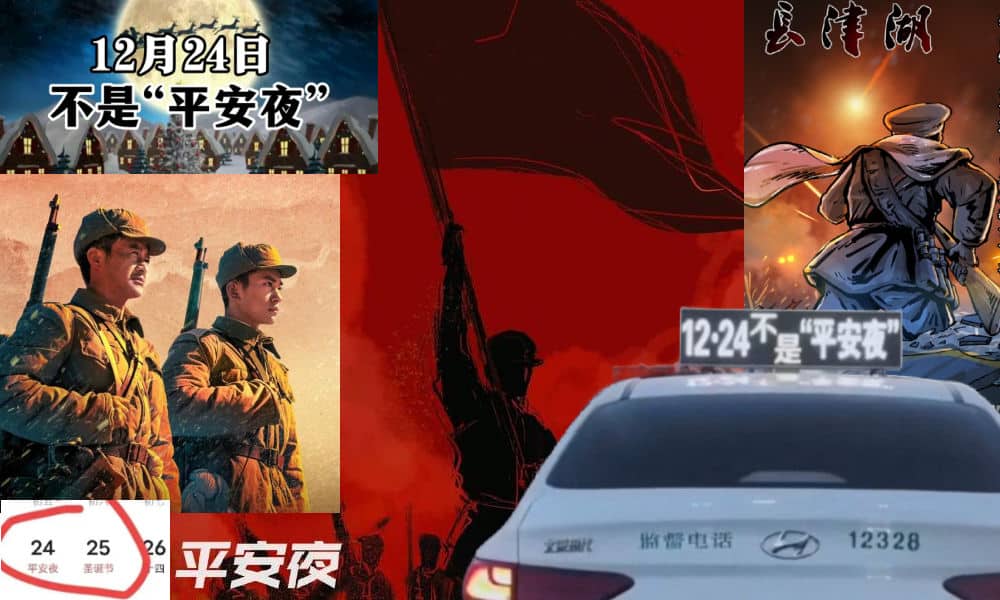
It is not Santa bringing you peace and joy, it is the People’s Liberation Army (PLA). Chinese state media and other influential social media accounts have been pushing an alternative Christmas narrative this year, which makes it very clear that this ‘Merry Christmas’ is brought by China’s military forces, not by a Western legendary figure.
On December 24, Party newspaper People’s Daily published a video on Weibo featuring various young PLA soldiers, writing:
“Thank you for your hard work! Thanks to their protection, we have a peaceful Christmas Eve. They come from all over the country, steadfastly guarding the front lines day and night. “With our youth, we defend our prosperous China!” Thank you, and salute!”
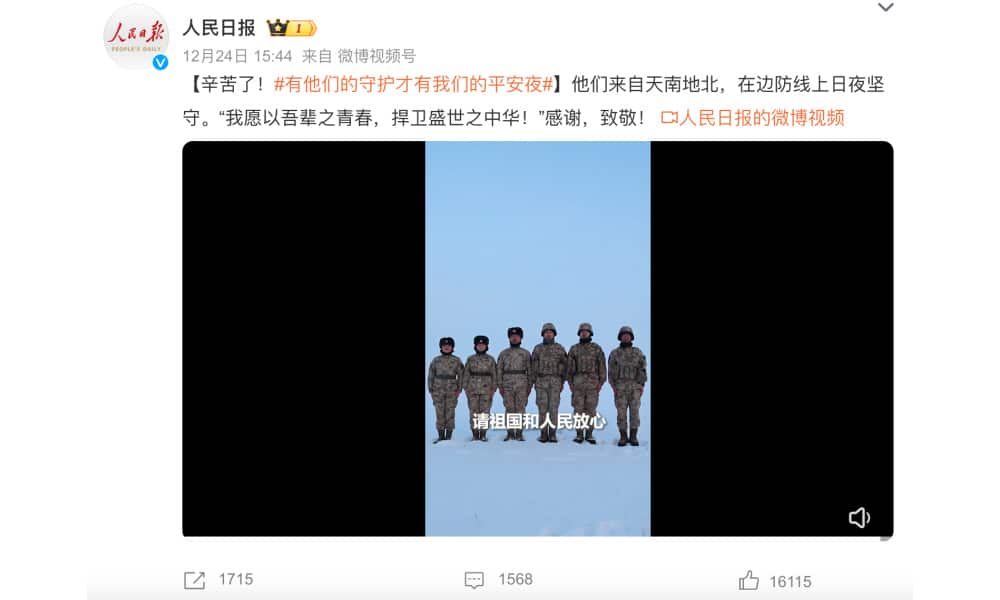
People’s Daily post on Weibo, December 24 2023.
The main argument that is propagated, is that this time in China should not be about Christmas and Santa Claus, but about remembering the end of the Korean War and paying tribute to China’s soldiers.
This narrative is not just promoted on social media by Chinese official media channels, it is also propagated in various other ways.
One Weibo user shared a photo of a mall in Binzhou where big banners were hanging reminding people of the 73rd anniversary of the Battle of Chosin Reservoir during the Korean War: “December 24 is not about Christmas Eve, but about the victory at Chosin Reservoir.”

Mall banners reminding Chinese that December 24 is about commemorating the end of the Second Phase Offensive (photo taken at 滨州吾悦广场/posted by 武汉潘唯杰).
Another blogger posted a video showing LED signs on taxis, allegedly in the Hinggan League in Inner Mongolia, with the words: “December 24 is NOT Christmas Eve, it is the military victory of the Battle of Chosin Reservoir” (“12.24不是平安夜,是长津湖战役胜利日”).
Chinese taxis with a message: December 24 is NOT "Christmas Eve" but a day to commemorate the Chinese victory during the Second Phase Offensive of the Korean War in 1950. It's not a Merry Christmas but a military one. Video posted on Weibo, allegedly recorded in Inner Mongolia. pic.twitter.com/XZlRTinmXr
— Manya Koetse (@manyapan) December 26, 2023
One social media video showed a teacher at a middle school in Chongqing also emphasizing to her students that “it’s not Father Christmas who brings us a happy and peaceful life, but our young soldiers!”
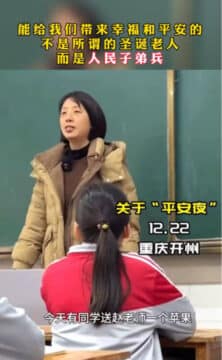
In the context of the Korean War (1950-1953), December 24 marks the conclusion of the Second Phase Offensive (1950), which was launched by the Chinese People’s Volunteer Army against the United Nations Command forces–primarily U.S. and South Korean troops.
The Chinese divisions’ surprise attack countered the ‘Home-by-Christmas’ campaign. This name stemmed from the UN forces’ belief that they would soon prevail, end the conflict, and be home well in time to celebrate Christmas. Instead, they were forced into retreat and the Chinese reclaimed most of North Korea by December 24, 1950.
The Battle of the Chosin Reservoir, also known as the the Battle at Lake Changjin, is part of this history. The battle began on November 27 of 1950, five months after the start of the Korean War. The 2021 movie Changjin Lake (长津湖/The Battle at Lake Changjin) provides a Chinese perspective on the lead-up and unfolding of this massive ground attack of the Chinese 9th Army Group, in which thousands of soldiers died.
Especially in recent years and in light of the launch of the blockbuster movie, there is an increased focus on the Chinese attack at Chosin as a glorious victory and strategic success for turning around the war situation in Korea and defending its own borders, underscoring the military strength of the People’s Republic of China as a new force to be reckoned with (read more here).
This Chinese Christmas narrative of honoring the PLA coincides with a series of popular social media posts from bloggers facing criticism for celebrating Christmas in China.
One of them is Liu Xiaoguang (刘晓光 @_恶魔奶爸_, 1.7 million followers), who wrote on December 25:
“Some people are criticizing me for celebrating Christmas Eve, because, by celebrating a foreign festival, I would be unpatriotic and forgetful of our martyrs. What can I say, in our family Christmas must be a big deal, even if I don’t come home it must be celebrated, because my mom is a Christian, and she’s very devout (..) So you see, on one hand I should promote traditional Chinese virtues, and show filial piety, on the other hand I should be patriotic and not celebrate foreign festivals.”
Meanwhile, other popular bloggers stress the importance of remembering China’s military heroes during this time. Influential media blogger Zhang Xiaolei (@晓磊) posted: “It’s not Santa Claus who gives you peace, it’s the Chinese soldiers! #ChristmasEve” (“给你平安的不是圣诞老人,而是中国军人!🙏#平安夜#”). With his post, he added various pictures showing Chinese soldiers frozen in the snow as also depicted in the Battle at Lake Changjin movie.

Throughout the years, Christmas has become more popular in China, but as a predominantly atheist country with a small proportion of Christians, the festival is more about the commercial side of the holiday season including shopping and promotions, decorations, entertainment, etc.
Nevertheless, Christmas in China is generally perceived as “a foreign” or “Western” festival, and there have been consistent concerns that the festivities associated with Christmas clash with traditional Chinese culture.
In the past, these concerns have led to actual bans on Christmas celebrations. For instance, in 2017, officials in Hengyang were instructed not to partake in Christmas festivities and several universities throughout China have previously cautioned students against engaging in Christmas-related activities.
Chinese political and social commentator Hu Xijin (@胡锡进) also weighed in on the issue. In his December 24 social media column, the former Global Times editor-in-chief wrote that there is no problem with Christmas Eve and the Second Phase Offensive victory day both receiving attention on the same day. Even if the younger generations in China view Christmas more as a commercial event rather than a religious one, it’s understandable for businesses to capitalize on this period for additional revenue. He wrote:
“In this era of globalization, holiday cultures inevitably influence each other. The Chinese government does not actively promote the rise of “Western holidays” for its own reasons, but they also have no intention to “suppress foreign holidays.” Some Chinese celebrate “Western holidays” and it is their right to do, they should not face criticism for it.”
Although many Chinese netizens post different viewpoints on this year’s Christmas debate, there are some who just don’t understand what all the fuss is about. “December 24 can be both Christmas Eve, and it can be Victory Day. It’s not like we need to pick one over the other. We are free to choose whatever.”
By Manya Koetse
Get the story behind the hashtag. Subscribe to What’s on Weibo here to receive our newsletter and get access to our latest articles:
Spotted a mistake or want to add something? Please let us know in comments below or email us. First-time commenters, please be patient – we will have to manually approve your comment before it appears.
©2023 Whatsonweibo. All rights reserved. Do not reproduce our content without permission – you can contact us at info@whatsonweibo.com.
Manya is the founder and editor-in-chief of What's on Weibo, offering independent analysis of social trends, online media, and digital culture in China for over a decade. Subscribe to gain access to content, including the Weibo Watch newsletter, which provides deeper insights into the China trends that matter. More about Manya at manyakoetse.com or follow on X.

Backgrounder
“Oppenheimer” in China: Highlighting the Story of Qian Xuesen
Qian Xuesen is a renowned Chinese scientist whose life shares remarkable parallels with Oppenheimer’s.
Published
2 years agoon
September 16, 2023By
Zilan Qian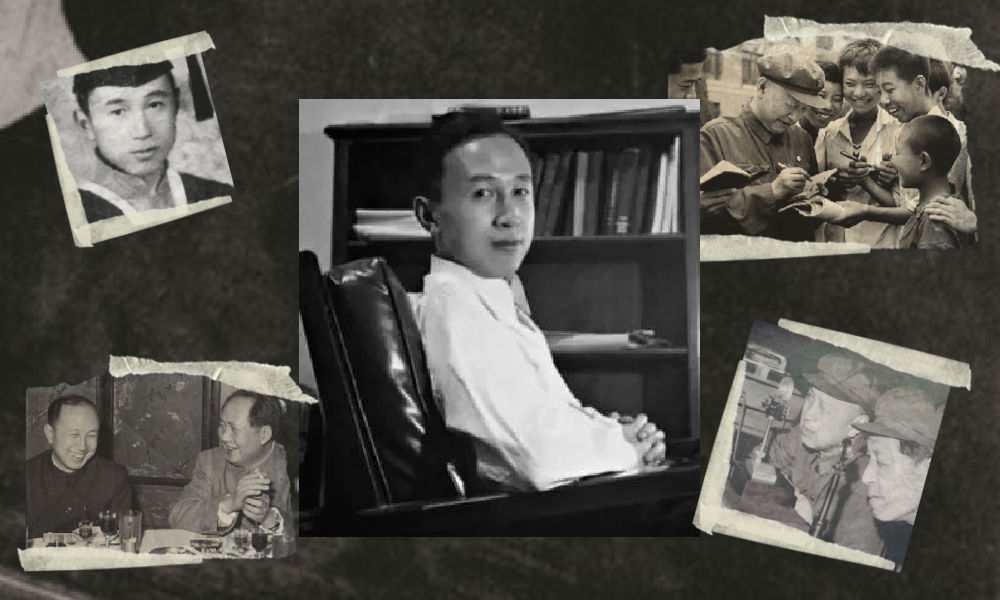
They shared the same campus, lived in the same era, and both played pivotal roles in shaping modern history while navigating the intricate interplay between science and politics. With the release of the “Oppenheimer” movie in China, the renowned Chinese scientist Qian Xuesen is being compared to the American J. Robert Oppenheimer.
In late August, the highly anticipated U.S. movie Oppenheimer finally premiered in China, shedding light on the life of the famous American theoretical physicist J. Robert Oppenheimer (1904-1967).
Besides igniting discussions about the life of this prominent scientist, the film has also reignited domestic media and public interest in Chinese scientists connected to Oppenheimer and nuclear physics.
There is one Chinese scientist whose life shares remarkable parallels with Oppenheimer’s. This is aerospace engineer and cyberneticist Qian Xuesen (钱学森, 1911-2009). Like Oppenheimer, he pursued his postgraduate studies overseas, taught at Caltech, and played a pivotal role during World War II for the US.
Qian Xuesen is so widely recognized in China that whenever I introduce myself there, I often clarify my last name by saying, “it’s the same Qian as Qian Xuesen’s,” to ensure that people get my name.
Some Chinese blogs recently compared the academic paths and scholarly contributions of the two scientists, while others highlighted the similarities in their political challenges, including the revocation of their security clearances.
The era of McCarthyism in the United States cast a shadow over Qian’s career, and, similar to Oppenheimer, he was branded as a “communist suspect.” Eventually, these political pressures forced him to return to China.
Although Qian’s return to China made his later life different from Oppenheimer’s, both scientists lived their lives navigating the complex dynamics between science and politics. Here, we provide a brief overview of the life and accomplishments of Qian Xuesen.
Departing: Going to America
Qian Xuesen (钱学森, also written as Hsue-Shen Tsien), often referred to as the “father of China’s missile and space program,” was born in Shanghai in 1911,1 a pivotal year marked by a historic revolution that brought an end to the imperial dynasty and gave rise to the Republic of China.
Much like Oppenheimer, who pursued further studies at Cambridge after completing his undergraduate education, Qian embarked on a journey to the United States following his bachelor’s studies at National Chiao Tung University (now Shanghai Jiao Tong University). He spent a year at Tsinghua University in preparation for his departure.
The year was 1935, during the eighth year of the Chinese Civil War and the fourth year of Japan’s invasion of China, setting the backdrop for his academic pursuits in a turbulent era.
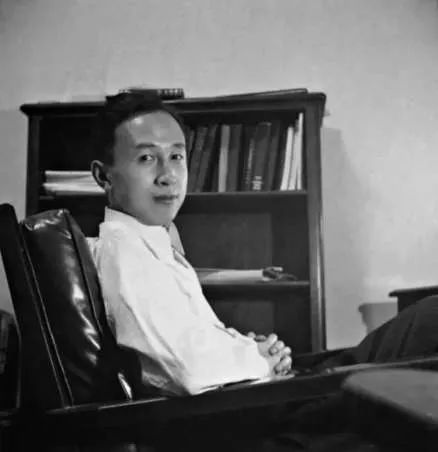
Qian in his office at Caltech (image source).
One year after arriving in the U.S., Qian earned his master’s degree in aeronautical engineering from the Massachusetts Institute of Technology (MIT). Three years later, in 1939, the 27-year-old Qian Xuesen completed his PhD at the California Institute of Technology (Caltech), the very institution where Oppenheimer had been welcomed in 1927. In 1943, Qian solidified his position in academia as an associate professor at Caltech. While at Caltech, Qian helped found NASA’s Jet Propulsion Laboratory.
When World War II began, while Oppenheimer was overseeing the Manhattan Project’s efforts to assist the U.S. in developing the atomic bomb, Qian actively supported the U.S. government. He served on the U.S. government’s Scientific Advisory Board and attained the rank of lieutenant colonel.

The first meeting of the US Department of the Air Force Scientific Advisory Board in 1946. The predecessor, the Scientific Advisory Group, was founded in 1944 to evaluate the aeronautical programs and facilities of the Axis powers of World War II. Qian can be seen standing in the back, the second on the left (image source).
After the war, Qian went to teach at MIT and returned to Caltech as a full-time professor in 1949. During that same year, Mao Zedong proclaimed the establishment of the People’s Republic of China (PRC). Just one year later, the newly-formed nation became involved in the Korean War, and China fought a bloody battle against the United States.
Red Scare: Being Labeled as a Communist
Robert Oppenheimer and Qian Xuesen both had an interest in Communism even prior to World War II, attending communist gatherings and showing sympathy towards the Communist cause.
Qian and Oppenheimer may have briefly met each other through their shared involvement in communist activities. During his time at Caltech, Qian secretly attended meetings with Frank Oppenheimer, the brother of J. Robert Oppenheimer (Monk 2013).
However, it was only after the war that their political leanings became a focal point for the FBI.
Just as the FBI accused Oppenheimer of being an agent of the Soviet Union, they quickly labeled Qian as a subversive communist, largely due to his Chinese heritage. While the government did not succeed in proving that Qian had communist ties with China during that period, they did ultimately succeed in portraying Qian as a communist affiliated with China a decade later.
During the transition from the 1940s to the 1950s, the Cold War was underway, and the anti-communist witch-hunts associated with the McCarthy era started to intensify (BBC 2020).
In 1950, the Korean War erupted, with the People’s Republic of China (PRC) joining North Korea in the conflict against South Korea, which received support from the United States. It was during this tumultuous period that the FBI officially accused Qian of communist sympathies in 1950, leading to the revocation of his security clearance despite objections from Qian’s colleagues. Four years later, in 1954, Robert Oppenheimer went through a similar process.
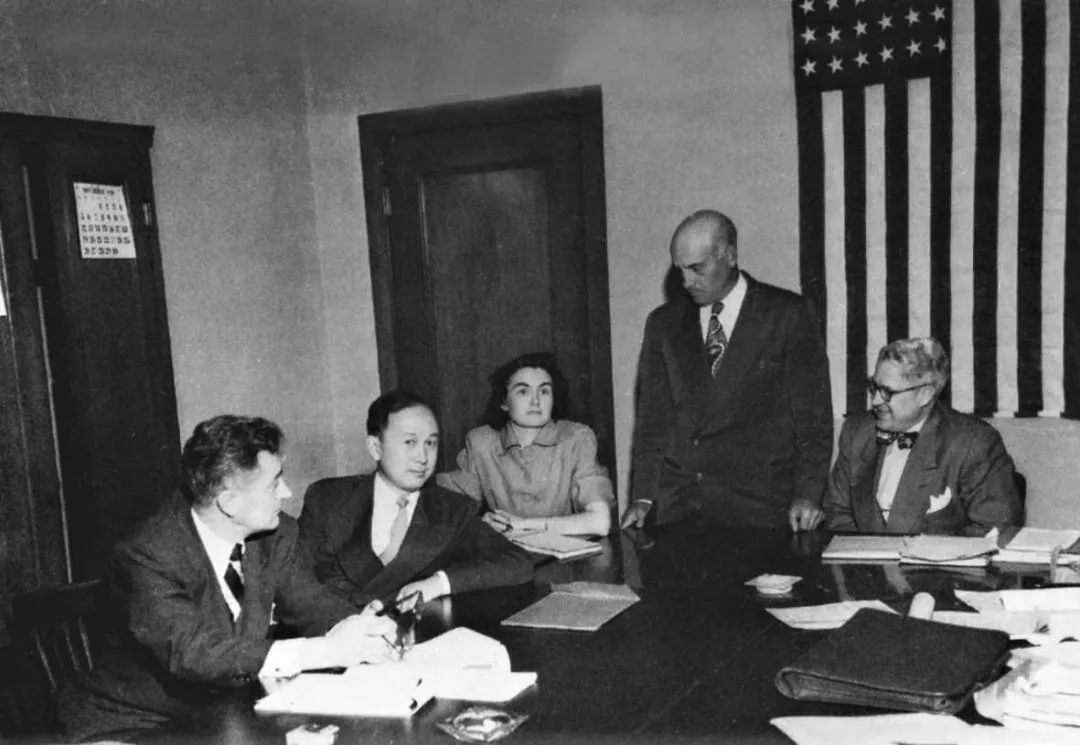
The 1950’s security hearing of Qian (second left). (Image source).
After losing his security clearance, Qian began to pack up, saying he wanted to visit his aging parents back home. Federal agents seized his luggage, which they claimed contained classified materials, and arrested him on suspicion of subversive activity. Although Qian denied any Communist leanings and rejected the accusation, he was detained by the government in California and spent the next five years under house arrest.
Five years later, in 1955, two years after the end of the Korean War, Qian was sent home to China as part of an apparent exchange for 11 American airmen who had been captured during the war. He told waiting reporters he “would never step foot in America again,” and he kept his promise (BBC 2020).
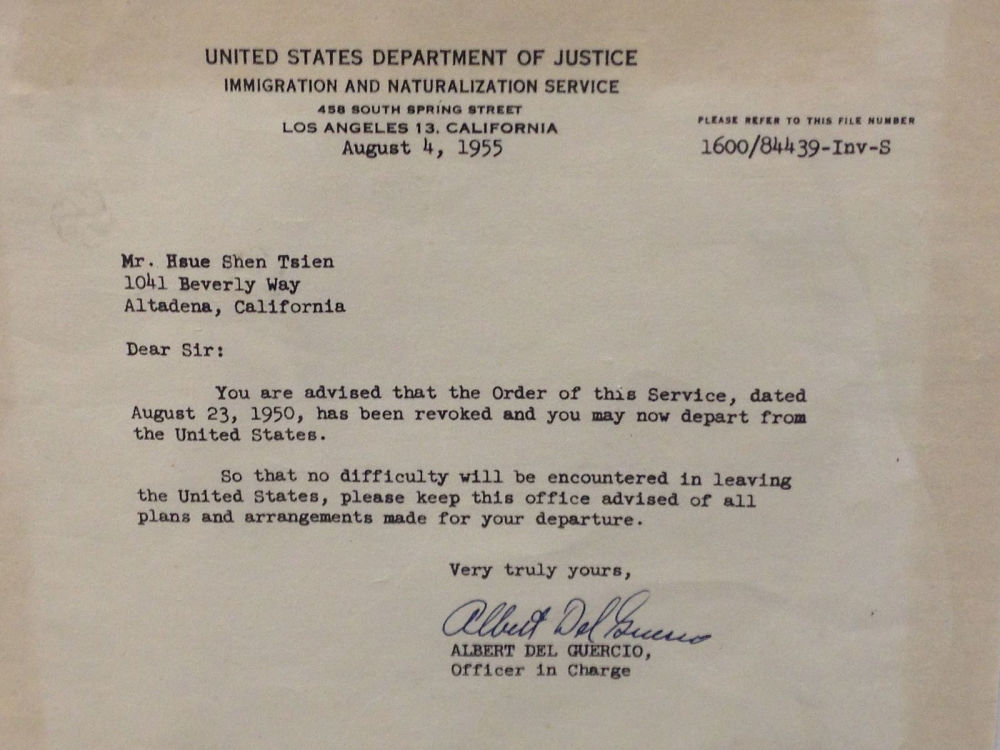
A letter from the US Immigration and Naturalization Service to Qian Xuesen, dated August 4, 1955, in which he was notified he was allowed to leave the US. The original copy is owned by Qian Xuesen Library of Shanghai Jiao Tong University, where the photo was taken. (Caption and image via wiki).
Dan Kimball, who was the Secretary of the US Navy at the time, expressed his regret about Qian’s departure, reportedly stating, “I’d rather shoot him dead than let him leave America. Wherever he goes, he equals five divisions.” He also stated: “It was the stupidest thing this country ever did. He was no more a communist than I was, and we forced him to go” (Perrett & Bradley, 2008).
Kimball may have foreseen the unfolding events accurately. After his return to China, Qian did indeed assume a pivotal role in enhancing China’s military capabilities, possibly surpassing the potency of five divisions. The missile programme that Qian helped develop in China resulted in weapons which were then fired back on America, including during the 1991 Gulf War (BBC 2020).
Returning: Becoming a National Hero
The China that Qian Xuesen had left behind was an entirely different China than the one he returned to. China, although having relatively few experts in the field, was embracing new possibilities and technologies related to rocketry and space exploration.
Within less than a month of his arrival, Qian was welcomed by the then Vice Prime Minister Chen Yi, and just four months later, he had the honor of meeting Chairman Mao himself.
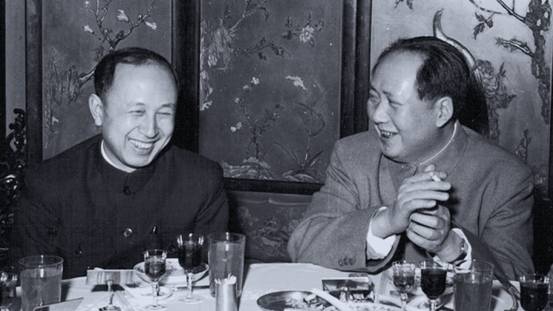
Qian and Mao (image source).
In China, Qian began a remarkably successful career in rocket science, with great support from the state. He not only assumed leadership but also earned the distinguished title of the “father” of the Chinese missile program, instrumental in equipping China with Dongfeng ballistic missiles, Silkworm anti-ship missiles, and Long March space rockets.
Additionally, his efforts laid the foundation for China’s contemporary surveillance system.
By now, Qian has become somewhat of a folk hero. His tale of returning to China despite being thwarted by the U.S. government has become like a legendary narrative in China: driven by unwavering patriotism, he willingly abandoned his overseas success, surmounted formidable challenges, and dedicated himself to his motherland.
Throughout his lifetime, Qian received numerous state medals in recognition of his work, establishing him as a nationally celebrated intellectual. From 1989 to 2001, the state-launched public movement “Learn from Qian Xuesen” was promoted throughout the country, and by 2001, when Qian turned 90, the national praise for him was on a similar level as that for Deng Xiaoping in the decade prior (Wang 2011).
Qian Xuesen remains a celebrated figure. On September 3rd of this year, a new “Qian Xuesen School” was established in Wenzhou, Zhejiang Province, becoming the sixth high school bearing the scientist’s name since the founding of the first one only a year ago.
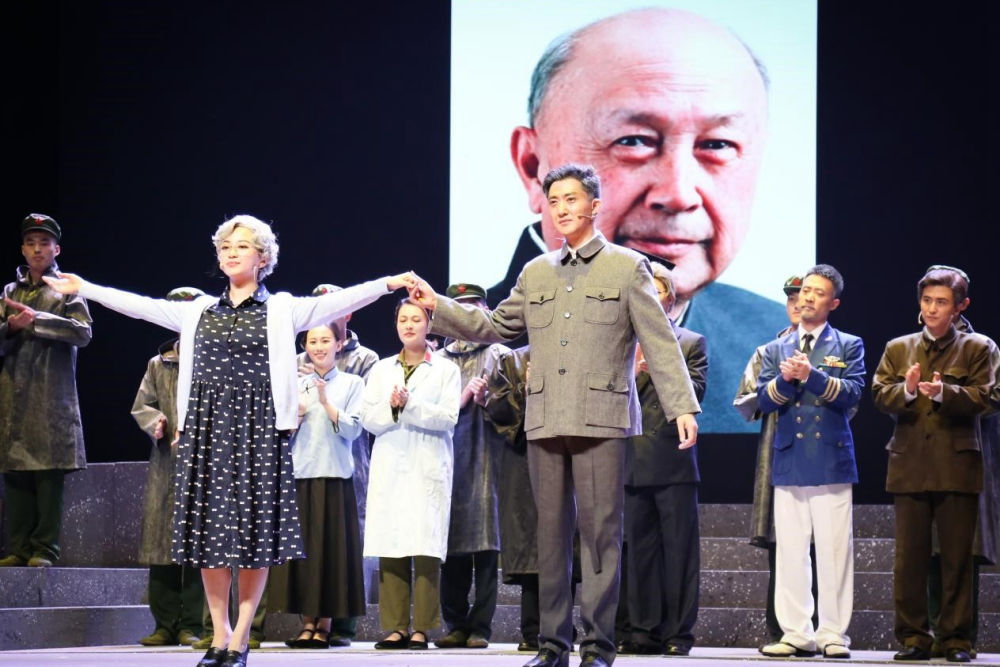
In 2017, the play “Qian Xuesen” was performed at Qian’s alma mater, Shanghai Jiaotong University. (Image source.)
Qian Xuesen’s legacy extends well beyond educational institutions. His name frequently appears in the media, including online articles, books, and other publications. There is the Qian Xuesen Library and a museum in Shanghai, containing over 70,000 artefacts related to him. Qian’s life story has also been the inspiration for a theater production and a 2012 movie titled Hsue-Shen Tsien (钱学森).2
Unanswered Questions
As is often the case when people are turned into heroes, some part of the stories are left behind while others are highlighted. This holds true for both Robert Oppenheimer and Qian Xuesen.
The Communist Party of China hailed Qian as a folk hero, aligning with their vision of a strong, patriotic nation. Many Chinese narratives avoid the debate over whether Qian’s return was linked to problems and accusations in the U.S., rather than genuine loyalty to his homeland.
In contrast, some international media have depicted Qian as a “political opportunist” who returned to China due to disillusionment with the U.S., also highlighting his criticism of “revisionist” colleagues during the Cultural Revolution and his denunciation of the 1989 student demonstrations.
Unlike the image of a resolute loyalist favored by the Chinese public, Qian’s political ideology was, in fact, not consistently aligned, and there were instances where he may have prioritized opportunity over loyalty at different stages of his life.
Qian also did not necessarily aspire to be a “flawless hero.” Upon returning to China, he declined all offers to have his biography written for him and refrained from sharing personal information with the media. Consequently, very little is known about his personal life, leaving many questions about the motivations driving him, and his true political inclinations.

The marriage photo of Qian and Jiang. (Image source).
We do know that Qian’s wife, Jiang Ying (蒋英), had a remarkable background. She was of Chinese-Japanese mixed race and was the daughter of a prominent military strategist associated with Chiang Kai-shek. Jiang Ying was also an accomplished opera singer and later became a professor of music and opera at the Central Conservatory of Music in Beijing.
Just as with Qian, there remain numerous unanswered questions surrounding Oppenheimer, including the extent of his communist sympathies and whether these sympathies indirectly assisted the Soviet Union during the Cold War.
Perhaps both scientists never imagined they would face these questions when they first decided to study physics. After all, they were scientists, not the heroes that some narratives portray them to be.
Also read:
■ Farewell to a Self-Taught Master: Remembering China’s Colorful, Bold, and Iconic Artist Huang Yongyu
■ “His Name Was Mao Anying”: Renewed Remembrance of Mao Zedong’s Son on Chinese Social Media
By Zilan Qian
Follow @whatsonweibo
1 Some sources claim that Qian was born in Hangzhou, while others say he was born in Shanghai with ancestral roots in Hangzhou.
2The Chinese character 钱 is typically romanized as “Qian” in Pinyin. However, “Tsien” is a romanization in Wu Chinese, which corresponds to the dialect spoken in the region where Qian Xuesen and his family have ancestral roots.
This article has been edited for clarity by Manya Koetse
References (other sources hyperlinked in text)
BBC. 2020. “Qian Xuesen: The man the US deported – who then helped China into space.” BBC.com, 27 October https://www.bbc.com/news/stories-54695598 [9.16.23].
Monk, Ray. 2013. Robert Oppenheimer: A Life inside the Center, First American Edition. New York: Doubleday.
Perrett, Bradley, and James R. Asker. 2008. “Person of the Year: Qian Xuesen.” Aviation Week and Space Technology 168 (1): 57-61.
Wang, Ning. 2011. “The Making of an Intellectual Hero: Chinese Narratives of Qian Xuesen.” The China Quarterly, 206, 352-371. doi:10.1017/S0305741011000300
Get the story behind the hashtag. Subscribe to What’s on Weibo here to receive our newsletter and get access to our latest articles:
Spotted a mistake or want to add something? Please let us know in comments below or email us. First-time commenters, please be patient – we will have to manually approve your comment before it appears.
©2023 Whatsonweibo. All rights reserved. Do not reproduce our content without permission – you can contact us at info@whatsonweibo.com.
China Fashion & Beauty
Fashion that Hurts? Online Debates on China’s Draft Law Regarding ‘Harmful’ Clothes
The proposed ban on clothing deemed harmful is stirring debate, with some arguing for the significance of protecting national pride and others emphasizing the value of personal expression.
Published
2 years agoon
September 8, 2023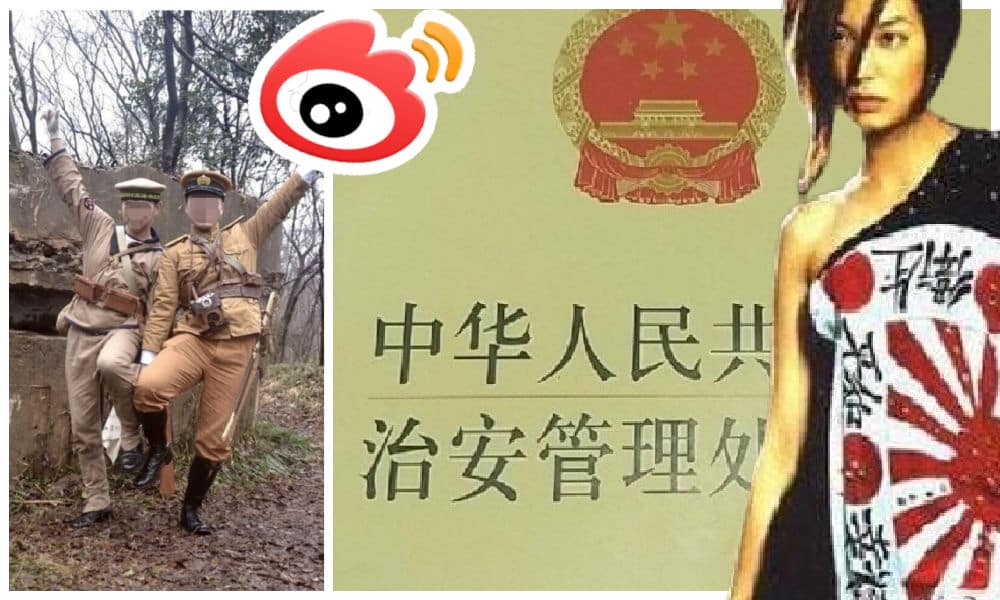
China’s recent proposal to ban clothing that “hurts national feelings” has triggered social media debates about freedom of dress and cultural sensitivities. The controversial amendment has raised questions about who decides what’s offensive for which reason.
A draft amendment to China’s Public Security Administration Punishments Law (治安管理处罚法) has caused some controversy this week for proposing a ban on clothes that “hurt national feelings.”
The discussions are about Article 34, clausules 3 and 4, which point out that wearing clothing or symbols that are deemed “harmful” to “the spirit and feelings of the Chinese nation” could become illegal. Offenders may face up to 15 days of detention and a fine of 5,000 yuan ($680).
The revised Article is part of a section about acts disrupting public order and their punishment, mentioning the protection of China’s heroes and martyrs.
Especially over the past three to four years, Chinese authorities have placed more importance on protecting the image of China’s “heroes and martyrs.” In 2018, the Heroes and Martyrs Protection Law was adopted to strengthen the protection of those who have made significant contributions to the nation and sacrificed their lives in the process.
Those insulting the PLA can face serious consequences. In 2021, former Economic Observer journalist Qiu Ziming (仇子明), along with two other bloggers, were the first persons to be charged under the new law as they were detained for “insulting” Chinese soldiers. Qiu, who had 2.4 million fans on his Weibo page, made remarks questioning the number of casualties China said it suffered in the India border clash. He was sentenced to eight months in prison.
Earlier this year, Chinese comedian Li Haoshi was canceled making a joke that indirectly made a comparison between PLA soldiers and stray dogs, while also placing words famously used by Xi Jinping in a ridiculous context.
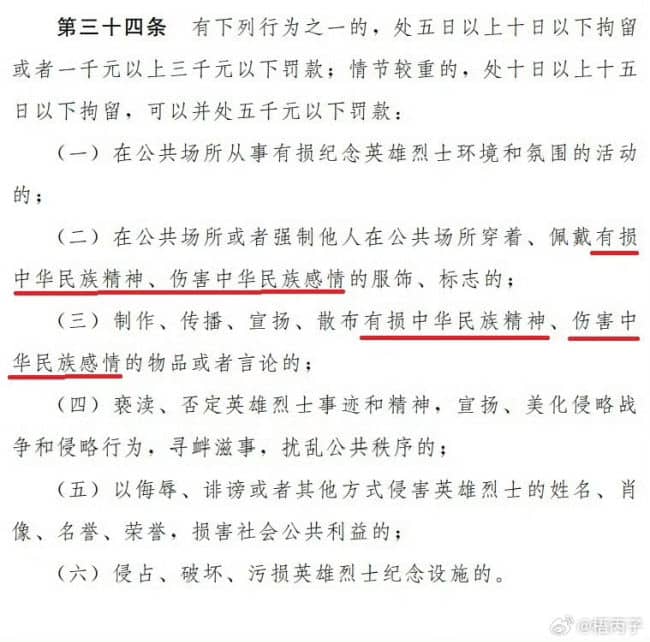
Screenshot of the draft widely shared on social media.
The draft is open for public comment through September 30, and it is therefore just a draft of a proposed amendment at this point.
Nevertheless, it has ignited many discussions on Chinese social media, where legal experts, bloggers, and regular netizens gave their views on the issue, with many people opposing the amendment.
This a translation of the first four clausules of Article 34 by Jeremy Daum’s China Law Translate (see the full translation here). Note that the discussions are focused on the item (2) and (3) revisions:
“Article 34:Those who commit any of the following acts are to be detained for between 5 and 10 days or be fined between 1,000 and 3,000 RMB; and where the circumstances are more serious, they are to be detained for between 10 and 15 days and may be concurrently fined up to 5,000 RMB:
(1) engaging in activities in public places that are detrimental to the environment and atmosphere for commemorating heroes and martyrs;
(2) Wearing clothing or bearing symbols in public places that are detrimental to the spirit of the Chinese people and hurt the feelings of the Chinese people, or forcing others do do so;
(3) Producing, transmitting, promoting, or disseminating items or speech that is detrimental to the spirit of the Chinese people and hurts the feelings of the Chinese people;
(4) Desecrating or negating the deeds and spirit of heroes and martyrs, or advocating or glorifying wars of aggression or aggressive conduct, provocation, or disrupting public order.”
Here, we mention the biggest online discussions surounding the draft amendment.
Main Objections to the Amendment
On Chinese social media site Weibo, commenters used various hashtags to discuss the recent draft, including the hashtags “China’s Proposed Amendment to the Public Security Administration Punishments Law” (#我国拟修订治安管理处罚法#), “Article 34 of the Draft Amendment to the Public Security Administration Punishments Law” (#治安管理处罚法修订草案第34条#) or “Harm the Feelings of the Chinese Nation” (#伤害中华民族感情#).
The issue that people are most concerned about is the vague definition “harming or hurting the spirit and feelings of the Chinese nation” (“伤害中华民族精神、感情”).
Although Chinese state media outlets, including the English-language Global Times, indicate that the clause is deemed to target some provocative actions to attract public attention, such as wearing Japanese military uniforms at sensitive sites, legal experts and social media users are expressing apprehensions regarding its ambiguity.
Questions arise: Who determines what qualifies as “harmful”? What criteria will be used? How will it be enforced? Beyond concerns about the absence of clear guidelines on which attire might be deemed illegal and for what reasons, there are fears of potential misinterpretation and misuse of such a law due to its subjective nature.
Some people question whether wearing foreign brands like Adidas or Nike could be considered offensive. There are also concerns about whether wearing sports attire supporting specific clubs might be seen as disrespectful. Another common topic is cosplay, a popular form of role-playing among China’s youth, where individuals dress up in costumes and accessories to portray specific characters. Can people still dress up in the way they like?
Well-known political commentator Hu Xijin published a video commentary about the issue on September 7, suggesting that the law in question could be more concrete and avoid misunderstanding by explicitly mentioning it targets facism, racism, or separatism. He also suggested that it is important for China’s legal system to provide people with a sense of security (– rather than scaring them).
Others reiterated similar views. If the clausules are indeed specifically about slandering national heroes and martyrs, which makes sense considering their context, they should be rephrased. One popular legal blogger (@皇城根下刀笔吏) wrote:
“The legal enforceability of harming the spirit and the feelings of the Chinese nation is not quite the same as insulting or slandering heroes. Because it is actually very clear who our national heroes are. They are classified as martyrs and were approved by the state, it’s very clear. But when it comes to the feelings and the spirit of the Chinese nation, this is just very vague (..) And ambiguity brings about a mismatch in the practice of implementation, which will make people lose trust in this legal provision and makes them feel unsafe.”
Although a majority of commenters agree that the proposed amendment is vague, some also express that they would support a ban on clothes that are especially offensive. Among them is the popular blogger Han Dongyan (@韩东言), who has over 2.3 million followers on Weibo.
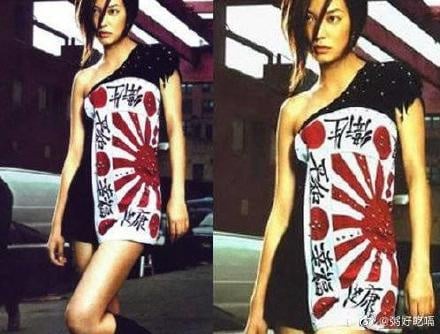
One example that is mentioned a lot, also by Han, is the 2001 controversy surrounding Chinese actress Vicky Zhao who wore a mini-dress printed with the old Japanese naval flag during a fashion shoot, triggering major backlash over her perceived lack of sensitivity to historical matters and the offensive dress.
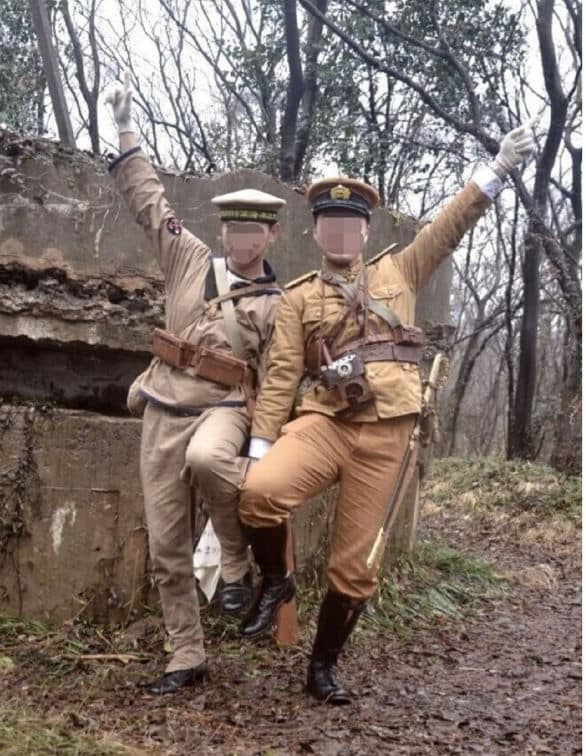
Han also mentioned a 2018 example of two young men dressed in Imperial Japanese military uniforms taking a photo in front of the Shaojiashan Bunker at Zijin Mountain, where the Second Sino-Japanese War is commemmorated.
Kimono Problems
One trending story that is very much entangled with recent discussions about the proposed ban on ‘harmful’ clothing is that about a group of Chinese men and women who were recently denied access to the Panlongcheng National Archaeological Site Park in Wuhan because staff members allegedly mistook their clothing for Japanese traditional attire.
The individuals were actually not wearing Japanese traditional dress at all; they were wearing traditional Tang dynasty clothing to take photos of themselves. This is part of the Hanfu Movement, a social trend that is popular among younger people who supports the wearing of Han Chinese ethnic clothing (read more).
Amid discussions over draft law banning clothes harmful to the "spirit, feelings of the Chinese nation," this incident sparked discussions: Chinese wearing Tang clothes were denied entry at Panlongcheng Park, Wuhan, after local guard mistook their clothes for Japanese attire. pic.twitter.com/IokazvhBhl
— Manya Koetse (@manyapan) September 8, 2023
According to Zhengguan News (正观新闻), there is no official park policy prohibiting the wearing of Japanese clothing, and an internal investigation into the incident is ongoing. The Paper reported that the incident allegedly happened around closing time.
Meanwhile, this incident has sparked discussions because it highlights the potential consequences when authorities arbitrarily enforce clothing rules and misinterpret situations. One netizen wrote: “It illustrates that when “some members of the public” cannot even tell the difference between Hanfu, Tang dynasty attire, and Japanese kimono, they are simply venting their emotions.”
Last year, a Chinese female cosplayer who was dressed in a Japanese summer kimono while taking pictures in Suzhou’s ‘Little Tokyo’ area was taken away by local police for ‘provoking trouble’ (read here).
A young Chinese woman was taken away by local police in Suzhou last Wednesday because she was wearing a kimono. "If you would be wearing Hanfu (Chinese traditional clothing), I never would have said this, but you are wearing a kimono, as a Chinese. You are Chinese!" pic.twitter.com/et8vWOferQ
— Manya Koetse (@manyapan) August 15, 2022
A video showed how the young woman was scolded by an officer for wearing the Japanese kimono, suggesting she is not allowed to do so as a Chinese person. The girl was known to be a cosplayer, and she was dressed up as the character Ushio Kofune from the Japanese manga series Summer Time Rendering, wearing a cotton summer kimono, better known as yukata.
The incident sparked extensive debates, with differing viewpoints emerging. While some believed the girl’s choice of wearing Japanese clothing during the week leading up to August 15, a memorial day marking the end of the war, was insensitive, many commenters defended her right to engage in cosplay.
These discussions are resurfacing on Weibo, underscoring the divided opinions on the matter.
One Weibo user expressed a common viewpoint: “I believe wearing a Japanese kimono in everyday situations is not a problem, but doing so at specific times and places could potentially offend the sentiments of the Chinese nation.” Another blogger (@猹斯拉) also voiced support for a law that could prohibit certain clothing: “If you genuinely believe what you’re wearing is not harmful, you always have the right to make your argument.”
However, there is also significant opposition, with some individuals posting images of themselves reading George Orwell’s 1984 at night or making cynical remarks like, “Maybe we should say nothing and wear nothing, as anything else could lead to our arrest.”
“This is not progress,” another person wrote: “It’s taking another step back in time.”
By Manya Koetse
Follow @whatsonweibo
With contributions by Miranda Barnes
Get the story behind the hashtag. Subscribe to What’s on Weibo here to receive our newsletter and get access to our latest articles:
Spotted a mistake or want to add something? Please let us know in comments below or email us. First-time commenters, please be patient – we will have to manually approve your comment before it appears.
©2023 Whatsonweibo. All rights reserved. Do not reproduce our content without permission – you can contact us at info@whatsonweibo.com.
Subscribe

Strange Encounter During IShowSpeed’s Chengdu Livestream

IShowSpeed in China: Streaming China’s Stories Well

How K-pop Fans and the 13-Year-Old Daughter of Baidu VP Sparked a Debate on Online Privacy

Squat or Sit? China’s Great Toilet Debate and the Problem of Footprints on the Seat

Weibo Watch: The Great Squat vs Sitting Toilet Debate in China🧻

Our Picks: Top 10 Chinese Buzzwords and Phrases of 2024 Explained

“Dear Li Hua”: The TikTok/Xiaohongshu Honeymoon Explained

Beyond the Box Office: What’s Behind Ne Zha 2’s Success?

Weibo Watch: Christmas in China Is Everywhere and Nowhere

Weibo Watch: A New Chapter

15 Years of Weibo: The Evolution of China’s Social Media Giant

Tuning Into the Year of the Snake

The ‘China-chic Girl’ Image and the Realities of China’s Competitive Food Delivery Market

TikTok Refugees, Xiaohongshu, and the Letters from Li Hua

“Black Myth: Wukong”: From Gaming Screens to the CMG Spring Festival Gala?
Get in touch
Would you like to become a contributor, or do you have any tips or suggestions? Get in touch here!
Popular Reads
-

 China Insight11 months ago
China Insight11 months agoThe Tragic Story of “Fat Cat”: How a Chinese Gamer’s Suicide Went Viral
-

 China Digital10 months ago
China Digital10 months agoChina’s 2024 Gaokao Triggers Online Discussions on AI
-

 China Arts & Entertainment11 months ago
China Arts & Entertainment11 months agoSinging Competition or Patriotic Fight? Hunan TV’s ‘Singer 2024’ Stirs Nationalistic Sentiments
-

 China Arts & Entertainment12 months ago
China Arts & Entertainment12 months ago“Old Bull Eating Young Grass”: 86-Year-Old Chinese Painter Fan Zeng Marries 36-Year-Old Xu Meng






